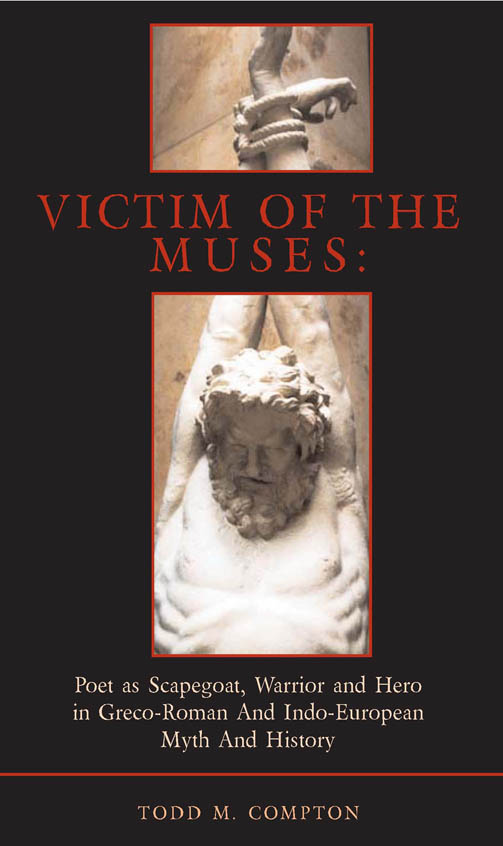

From the cover:
This book, which has relevance both for literary history and comparative religion, probes the narratives of poets who are exiled, tried or executed for their satire. Aesop, fabulist and riddle warrior, is assimilated to the pharmakos--the wretched human scapegoat who is expelled from the city or killed in response to a crisis--after satirizing the Delphians. Other prominent legendary and historical Greek and Roman poets, such as Archilochus, Homer, Hesiod, Sappho, Tyrtaeus, Euripides, Socrates, Naevius, Cicero, Ovid, and Juvenal, are also considered in this context.
In much the same way, Dumezil's Indo-European heroes, Starkathr and Suibhne, are both warrior-poets persecuted by patron deities. This book views the scapegoat as a group's dominant warrior, sent out to confront predators or besieging forces. Both poets and warriors specialize in madness and aggression, are necessary to society, yet dangerous to society.
Some reviews:
Pascale Hummel, review in Phoenix, Journal of the Classical Association of Canada 62.1 (Spring 2008): 196-97. “The author of this book approaches his subject with the freedom of a spirit that is both a gourmand and an adventurer. The poet-scapegoat is at the center of his work: the theme is not new, but it has rarely been treated by itself. Four parts [in the book] ... delineate it with neutrality and brio.... We have here a book that is very readable, neutral, rigorous and impartial, well documented, rich and suggestive, which speaks to the public of non-specialists, at the same time that it methodically integrates the precise elements characteristic of the most rigorous philology.” [translated from French]
David F. Elmer, review in The Journal of Indo-European Studies 36.1-2 (Spring/ Summer 2008): 190-95. Elmer has some disagreements with my interpretations. Nevertheless, “Compton’s thoroughly researched work has much to contribute to the study of individual poets’ lives and to the study of the lives as a generic form or cultural phenomenon. The book’s chief virtue is the cumulative force with which it demonstrates the extent to which the vitae are shaped by traditional influences, independently both of history and of the literary corpus of the poet in question....Victim of the Muses is thought-provoking reading for those interested in the tensions surround the practice of poetry in the Greek and Roman worlds, or in the complex meanings that can be encoded in biographical writing. Although one can imagine alternatives to the interpretations Compton proposes, his compendious assembly of biographical anecdotes provides an illuminating glimpse into a world in which myth and history interact in endlessly interesting ways.”
Testimonia for Victim of the Muses:
The following testimonia are provided because they were often hard to obtain. I have not made any attempt to achieve completeness, but have selected some of the most important texts for the selected subjects.
The font is Gentium , which you may need to read the Greek. This can be downloaded for free.
Greece
The Greek pharmakos (the ritual scapegoat)
Androgeus
Codrus
Aglauros
Ireland
The Story of the Poet Nede and his Uncle, King Caier
The Siege of Howth
Battle of Allen
Rome
The scholiast lives of Juvenal